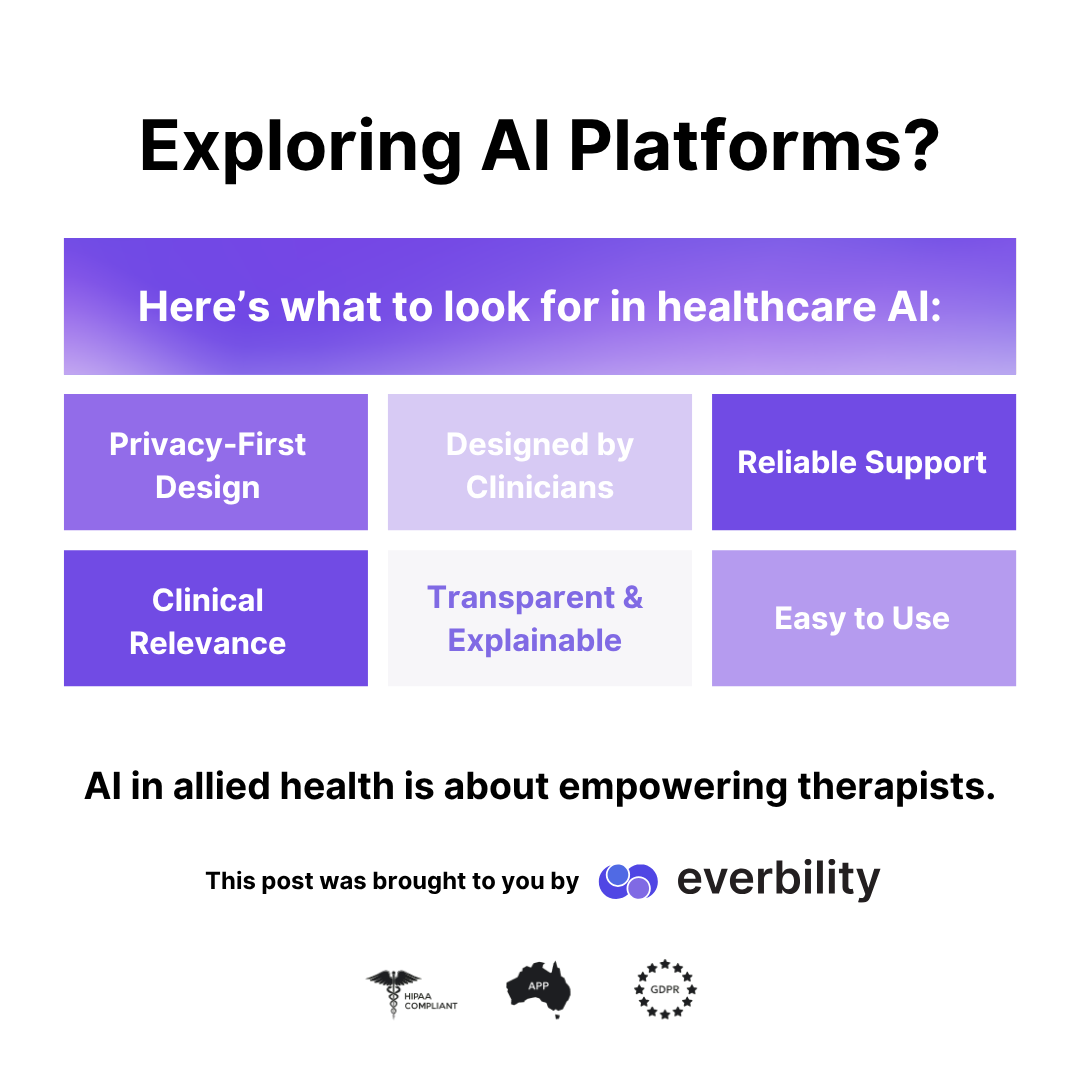- Published on
Exploring AI Platforms? What to Look for in Healthcare AI
- Authors
- Name
- Bella Martini

Introduction
- 1. Privacy-First Design
- 2. Clinical Relevance
- 3. Designed by Clinicians
- 4. Easy to Use
- 5. Transparent and Explainable
- 6. Empowers Therapists
- 7. Reliable Support
AI is changing the way we work in healthcare, especially in allied health. From reducing admin to supporting clinical reasoning, the right AI platform can offer enormous benefits. But with so many options out there, how do you know which tools are actually built for therapists?
If you're exploring AI platforms, here’s what to look for in a solution that is truly fit for healthcare:
1. Privacy-First Design
Client information is sensitive and must be treated with care. Look for platforms that put privacy at the core of their design. This means secure data storage, encryption, access controls, and compliance with key regulations like GDPR, HIPAA, or the Australian Privacy Principles. You should never have to compromise on confidentiality when using technology in your practice.
2. Clinical Relevance
AI built for healthcare should actually understand healthcare. That includes the language, the priorities, and the complexities of clinical documentation. Look for tools that support your existing workflows, not ones that try to replace or oversimplify them.
Whether it’s writing a report, summarising a session, or organising case notes, the platform should feel relevant to your day-to-day work.
3. Designed by Clinicians
Some of the best AI platforms in healthcare are created by people who understand the clinical world. If a tool has been designed in collaboration with therapists (or by therapists), you are more likely to find features that meet your real needs; from flexible templates to accurate terminology and context-aware support.
4. Easy to Use
Therapists are busy, and learning a complicated new system shouldn’t add to the workload. Good AI tools are simple to navigate, with intuitive interfaces and helpful prompts. They should feel like a helpful assistant, not another system to wrestle with.
Bonus points if it works well across devices and can be picked up without hours of training.
5. Transparent and Explainable
AI shouldn’t feel like a black box. You should be able to see what the tool is doing, understand how it reached a suggestion, and edit or override it as needed. Transparency builds trust and helps you stay in control of your documentation.
A good AI platform makes it easy to guide the output and doesn’t make assumptions on your behalf.
6. Empowers Therapists
AI in allied health is not about replacing therapists. It is about freeing them up to do more of what matters - clinical care, problem solving, reflection, and connection. The best tools respect your skills and judgement, offering support without taking over.
Look for platforms that keep you in the driver’s seat and enhance, rather than dilute, your clinical voice.
7. Reliable Support
Even the best technology needs a human touch. Choose a platform that offers accessible support when you need it. Whether it’s help with setup, questions about compliance, or advice on using templates, having a responsive support team makes all the difference.
Exploring AI platforms for healthcare can feel overwhelming, but focusing on these key principles helps narrow it down. The right AI tool should protect your clients, support your clinical work, and fit seamlessly into your existing workflow.
AI in allied health is not just about efficiency. It’s about working smarter, not harder.
Interested in exploring Everbility? Click below to book a demo and we’ll walk you through it.